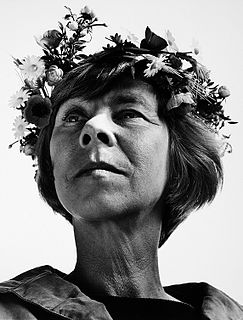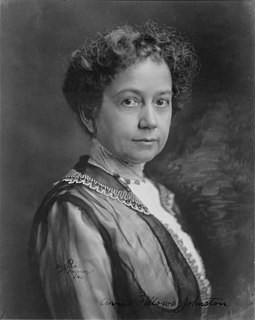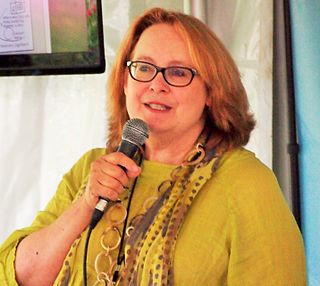A Quote by Alan Bennett
The appeal of reading, she thought, lay in its indifference: there was something undeferring about literature. Books did not care who was reading them or whether one read them or not. All readers were equal, herself included. Literature, she thought, is a commonwealth; letters a republic.
Related Quotes
I remember one letter from a girl in a midwestern town who read one of my books and thought she had discovered it- that no one had ever read it or knew about it. Then one day in her local library she found cards for one or two of my other books. They were full of names- the books were borrowed all the time. She resented this a bit and then walked around the town looking in everybody's face and wondering if they were the ones who were reading my books. That is someone I write for.
Forever, reading has been central, the necessary fix, the support system. Her life has been informed by reading. She has read not just for distraction, sustenance, to pass the time, but she has read in a state of primal innocence, reading for enlightenment, for instruction, even. ... She is as much a product of what she has read as of the way in which she has lived; she is like millions of others built by books, for whom books are an essential foodstuff, who could starve without.
When Mats came in the evenings, they would drink tea in the kitchen while reading their books and talking about them. If Katri came in, they were quiet and waited for her to leave. The back door would close, and Katri would have gone. “Does your sister read our books?” Anna wanted to know. “No. She reads literature.
Well-meaning adults can easily destroy a child’s love of reading: stop them reading what they enjoy, or give them worthy-but-dull books that you like, the 21st-century equivalents of Victorian “improving” literature. You’ll wind up with a generation convinced that reading is uncool and worse, unpleasant.
Our house was littered with books- in the kitchen, under the beds, stuck between the couch pillows--far too many for her the ever finish. I suppose I thought if my grandmother kept up her interests, she wouldn't die; she'd have to stay around to finish the books she was so fond of. "I've got to get to the bottom of this one," she'd say, as if a book were no different from a pond or a lake. I thought she'd go on reading forever but it didn't work out that way.
The Librarian considered matters for a while. So…a dwarf and a troll. He preferred both species to humans. For one thing, neither of them were great readers. The Librarian was, of course, very much in favor of reading in general, but readers in particular got on his nerves. There was something, well, sacrilegious about the way they kept taking books off the shelves and wearing out the words by reading them. He liked people who loved and respected books, and the best way to do that, in the Librarian’s opinion, was to leave them on the shelves where Nature intended them to be.
Mahlia... understood Doctor Mahfouz and his blind rush into the village. He wasn't trying to change them. He wasn't trying to save anyone. He was just trying to not be part of the sickness. Mahlia had thought he was stupid for walking straight into death, but now, as she lay against the pillar, she saw it differently. She thought she'd been surviving. She thought that she'd been fighting for herself. But all she'd done was create more killing, and in the end it had all led to this moment, where they bargained with a demon ... not for their lives, but for their souls
For the first time in her life Granny wondered whether there might be something important in all these books people were setting store by these days, although she was opposed to books on strict moral grounds, since she had heard that many of them were written by dead people and therefore it stood to reason reading them would be as bad as necromancy. Among the many things in the infinitely varied universe with which Granny did not hold was talking to dead people, who by all accounts had enough troubles of their own.
The little dog-eared books in the meeting-house proved poor reading ... So many of them were about unnaturally good children who never did wrong, and unnaturally bad children who never did right. At the end there was always the word MORAL, in big capital letters, as if the readers were supposed to be too blind to find it for themselves, and it had to be put directly across the path for them to stumble over.
My platform has been to reach reluctant readers. And one of the best ways I found to motivate them is to connect them with reading that interests them, to expand the definition of reading to include humor, science fiction/fantasy, nonfiction, graphic novels, wordless books, audio books and comic books.
Because most of the girls were still in mourning and all of them had lost their textbooks, even pencils and pens, Shaukat Ali began the first classes by reading to them from poetry and religious texts. "Reading, literature, and spirituality are good for the soul," he told them. "So we will start with these studies.
As a children's author, you get to advocate for reading and writing in general, in a way an adult author might not be able to. It's a really interesting dance we do to get literature into the hands of young people and to help them to become literate and become readers; we want them to grow up reading and continue to do so when they're adults.
As for literature – to introduce children to literature is to install them in a very rich and glorious kingdom, to bring a continual holiday to their doors, to lay before them a feast exquisitely served. But they must learn to know literature by being familiar with it from the very first. A child's intercourse must always be with good books, the best that we can find.




































